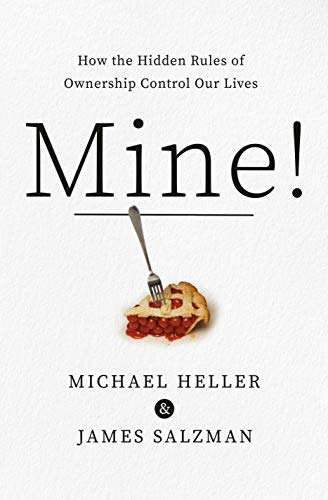The Volokh Conspiracy
Mostly law professors | Sometimes contrarian | Often libertarian | Always independent
Knee Defenders and Virtual Laps—Part 1
On a crowded flight, is there a right to recline or a right to defend your knees? And what does this teach us about the hidden rules of ownership?
This post is adapted from our new book, Mine!: How the Hidden Rules of Ownership Control Our Lives.

Who owns the space behind your airplane seat: you reclining or the squished laptop user behind? And who owns your online life: you clicking around or Facebook selling your most intimate data?
Turns out, these puzzles are both the same puzzle and they share a single answer: you lose. The prize goes to those who know how the simple rules of ownership really work.
James Beach is a large guy, over six feet tall. On a United Airlines flight from Newark to Denver, the businessman lowered his tray table and attached his Knee Defender. The Knee Defender is a simple plastic clamp available for $21.95 that locks the seat in front. Its website claims the clamp will "stop reclining seats on airplanes so your knees won't have to." Assured of his workspace, Beach opened his laptop.
The Knee Defender claims are real. When the passenger sitting in front of Beach tried to recline, her seat didn't budge. Outraged, she slammed her seat back, popping out the Knee Defender and jolting Beach's laptop. He quickly jammed her seat back up and reattached the clamp. She turned around and threw her drink at Beach. The pilot changed course to Chicago for an emergency landing and both passengers were removed from the plane.

These high-altitude brawls are happening more and more. Last year, on an American Airlines flight from New Orleans to North Carolina, Wendi Williams reclined her seat. The man behind was in the last row, so he could not recline. Instead, he tapped the back of Williams's seat repeatedly, like an irritating metronome. Her video of this high-altitude fracas quickly went viral.
After each incident, the blogosphere boomed back and forth with indignant commentary. Talk show host Ellen DeGeneres defended Williams: "The only time it's ever okay to punch someone's seat is if the seat punches you first." Delta Air Lines chief executive Ed Bastian took an opposing view: "The proper thing to do is, if you're going to recline into somebody, you ask if it's OK first." Williams didn't ask.
So who's right?
Williams's view is simple: her armrest button reclines her seat, so the space belongs her. My home is my castle, and anything attached to it is also mine.
Attachment is the most important ownership principle you've never heard of. It's why landowners in Texas can extract underground oil, why California's Central Valley is sinking, why Alaska can sustainably manage Bering Sea fisheries—and why occasional homeowners feel justified in shotgun blasting drones hovering above their backyards. Attachment is what translates two-dimensional boarding passes, land deeds, and maps into three-dimensional control of valuable resources.
But attachment is not the only ownership rule in play. At the beginning of every flight, all seats are in the "full, upright, and locked position." At that moment, Beach had exclusive use of the space in front of him. He had first dibs on the wedge. First-in-time is a second core rule for claiming mine. Kids assert it on the playground; adults invoke it up in the air. It's mine because I was first. Recall that Beach actually took physical control of the wedge with his Knee Defender. And there's a third rule. Possession. Nine-tenths of the law. Mine because I'm holding onto it. Possession means I get to defend my workspace.
Air travel brings into sharp focus three conflicting rules—attachment, first-in-time, and possession.
Each side picks the story that gives it the moral high ground, each side wants ownership bent toward its view. But there is no natural, correct answer to mine versus mine battles. Ownership is always up for grabs.
When we ask audiences about the Knee Defender conflict, the answer is always the same, whether we're talking with our law students at Columbia and UCLA or a non-law crowd. Most people respond with versions of "It's obvious." But when we ask for a show of hands, people generally split between Williams and Beach—and everyone looks at each other with incredulity. In a 2020 national poll, about half replied, "If it can recline, I'm reclining," and the other half said, "No, just don't do it." Everyone feels in the right, as did Williams and Beach. That's why Williams felt justified in posting her video and Beach didn't hesitate to shove the front seat forward. Don't mess with what's mine.
Tomorrow, in part 2, we explore why these high-altitude brawls are breaking out now and how deliberate ambiguity is an advanced tool of ownership design. Part 3 will show how the Knee Defender story explains everything from how the West was settled a century ago to battles today over who owns our online data.



Show Comments (69)